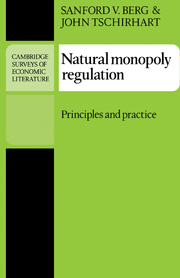Book contents
- Frontmatter
- Contents
- Preface
- 1 Introduction to regulatory economics
- Part I Optimal pricing and investment for natural monopolies
- Part II Natural monopoly regulation in practice
- 8 Regulation in practice: Why and how are firms regulated?
- 9 Models of regulatory constraints
- 10 Technological change under regulation
- 11 Partial regulation, deregulation, and diversification
- 12 Alternatives to traditional regulation
- References
- Author index
- Subject index
11 - Partial regulation, deregulation, and diversification
Published online by Cambridge University Press: 06 November 2009
- Frontmatter
- Contents
- Preface
- 1 Introduction to regulatory economics
- Part I Optimal pricing and investment for natural monopolies
- Part II Natural monopoly regulation in practice
- 8 Regulation in practice: Why and how are firms regulated?
- 9 Models of regulatory constraints
- 10 Technological change under regulation
- 11 Partial regulation, deregulation, and diversification
- 12 Alternatives to traditional regulation
- References
- Author index
- Subject index
Summary
In Part I of this book, we carefully delimited the conditions that justify natural monopoly regulation. Using concepts of subadditivity, contestability, sustainability, and whether the natural monopoly was strong or weak, the conditions were summarized in Table 7.1. Applying these conditions to formulate public policy is problematic, because they represent polar cases, involve difficult empirical examinations of industry cost and demand functions, and can require projections of technological developments. Nevertheless, the ultimate goal of economists working in this arena is to translate these conditions into recommendations concerning which industries should be regulated and which industries should be deregulated because contestable markets and sustainability will ensure relatively efficient outcomes.
Unfortunately, the real world does not always wait for economists to make recommendations. In the late 1970s and the 1980s, policy-makers made many changes in the extent of the regulator's domain, without necessarily waiting for widespread agreement among economists (admittedly an elusive goal) as to the efficacy of such policies. On the one hand are the trucking and airline industries, which have been largely deregulated. Here, there probably is widespread agreement among economists that this policy was proper, because either firms in these industries are not natural monopolies or else the markets are contestable. In fact, deregulation of the airlines probably is one of the crowning achievements of regulatory economic analysis, particularly because it was orchestrated by CAB commissioner Alfred Kahn under the constant scrutiny of the public (McCraw, 1984).
On the other hand are the telecommunications, railroad, and natural-gas industries, which have been partially deregulated. The need for deregulation, or at least particular mixes of deregulation activity, was less clear.
- Type
- Chapter
- Information
- Natural Monopoly RegulationPrinciples and Practice, pp. 428 - 479Publisher: Cambridge University PressPrint publication year: 1989



